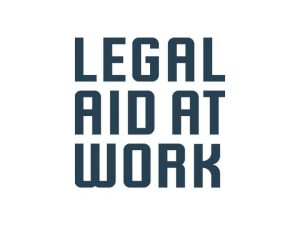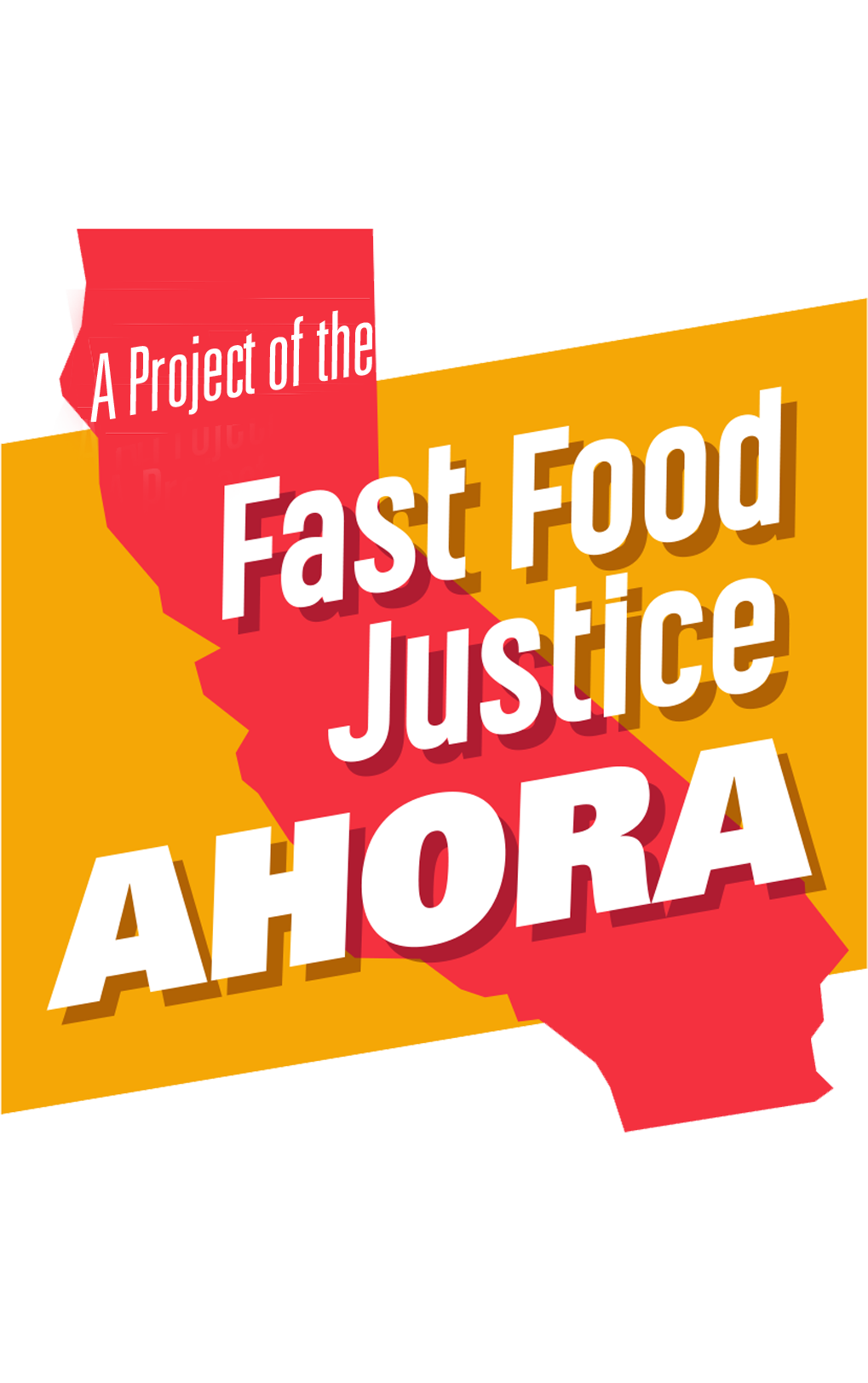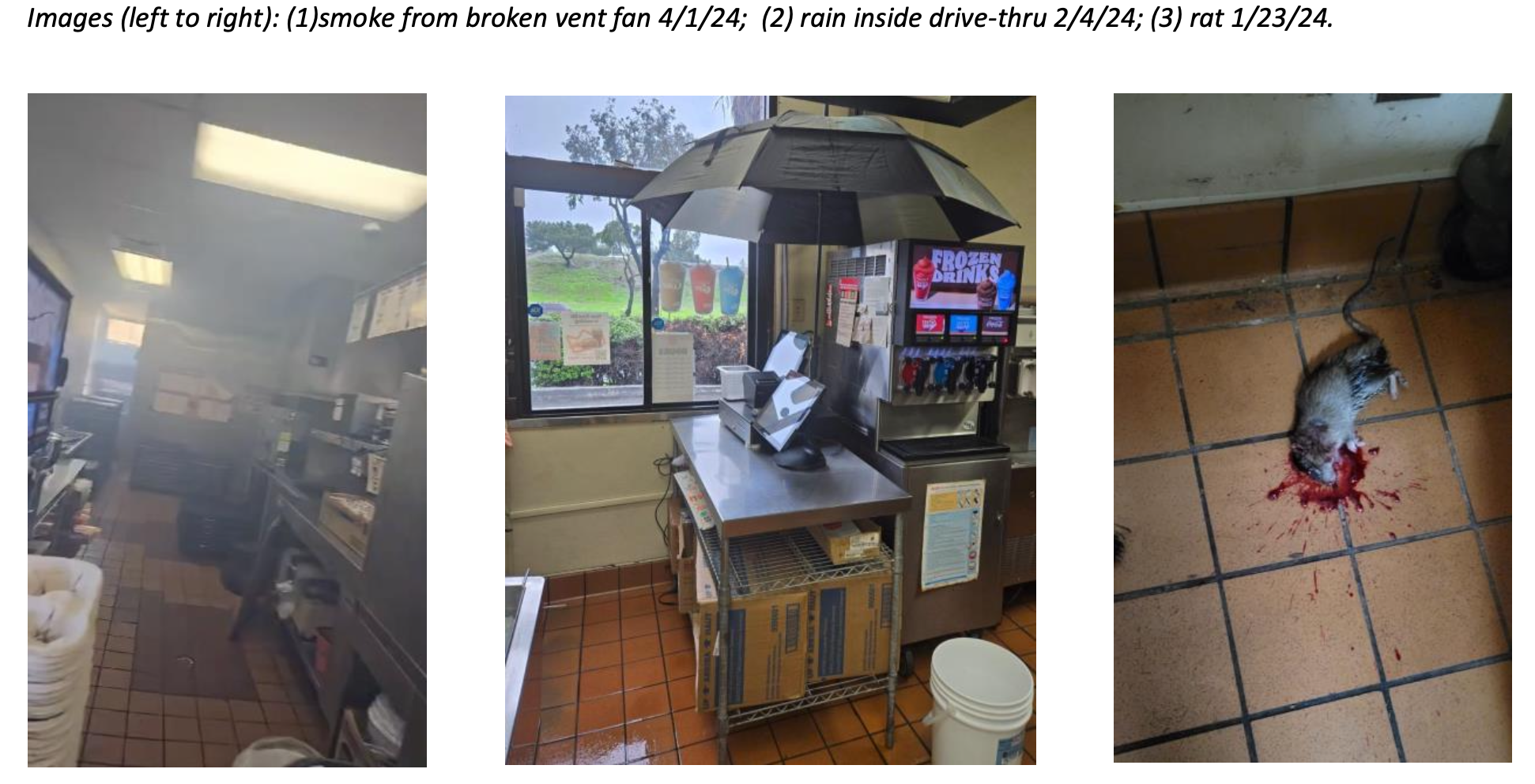News and Studies
Featured News and Reports

Fast food workers rally at City Hall, call for ‘Know Your Rights’ policy
Workers and union officials rallied at Los Angeles City Hall Wednesday to discuss a report that found nearly two-thirds of California’s fast-food workers who responded to a survey do not know that all workers, regardless of immigration status, can file workplace-related complaints, claims, or lawsuits.
Members of the Coalition for Humane Immigrant Rights of Los Angeles and fast-food workers represented by the California Fast Food Workers Union also joined City Councilman Hugo Soto-Martinez to urge the council to extend worker protections under the so-called Fast Food Fair Work Week Ordinance.
The study also found that many workers fear their employer will retaliate against them with immigration threats. Of 400 workers surveyed, about 82% said those who worried about their immigration status are less likely to report workplace malpractice and abuse.

California immigrant fast-food workers afraid to report work abuses
A report on fast-food workers shows immigrants are often too scared to report violations and are largely unaware of their rights…
The report recommends fast-food workers get training to ensure they know their legal protections. Trujillo said these trainings inform workers of their rights, and give them the tools needed to advocate for themselves if they experience intimidation or other workplace violations.
Armando, a San Jose fast-food worker who requested to use a different name out of fear of retaliation, said learning about his rights helped him file a complaint against a series of workplace abuses at his job.
“I experienced a lot of violations, like wage theft, sexual harassment and they made me feel like I had no rights,” he told San José Spotlight. “When I joined the union and started listening in on the trainings, I learned about workplace abuses and it was really surprising and confusing to me, because I realized that everything they were doing at work was wrong.”
He said knowing about existing protections against harassment helped him speak up against abuse, and that more workers need to learn their rights

Report: OUR RIGHTS AT WORK: Pregnancy & Parenting in Fast Food
When management at El Pollo Loco refused to put Sophia Lopez back on the schedule after she recovered from her C-section, she and her husband fell behind on rent and found themselves on the brink of homelessness with their new baby Thiago and two-year-old daughter Maddison.
“My coworkers went on strike to demand management at El Pollo Loco give me my job back. No one should have to go on strike to help a coworker get their job back after having a baby,” says Sophia.
Workers in California’s fast food industry experience frequent violations of workplace rights related to their reproductive health and wellbeing. Workers often report being denied time off for prenatal care, being forced to return to work before they have healed from childbirth, having their hours slashed, or being pushed out of their jobs due to pregnancy or childbirth.
Column: The latest info on California’s $20 minimum wage for fast food workers — higher pay, no job losses and minimal price hikes
Which of California’s economic initiatives droves conservatives batty the most? No question: It’s the state’s $20 minimum wage for fast food workers, which went into effect April 1.
Two new analyses of the actual wage and price impacts of the $20-per-hour minimum have appeared this month. They employ slightly different statistics, but their conclusions are the same: There have been no job losses in fast food resulting from the increase. By some measures, employment has increased.

California’s $20 fast food minimum wage didn’t lead to major job losses, study finds
A study from the University of California Berkeley’s Institute for Research on Labor and Employment found that a California state law raised the minimum wage for fast food workers did not lead to large job loses or price hikes.
AB 1228 went into effect in the Golden State April 1, setting a $20 per hour minimum wage for those working at fast food restaurants with less than 60 locations nationwide and restaurants located inside airports, stadiums and convention centers. The law further gave employees stronger protections and the ability to bargain as a sector.
“We find that the sectoral wage standard raised average pay of non-managerial fast food workers by nearly 18 percent, a remarkably large increase when compared to previous minimum wage policies,” the study, published Sept. 30, said. “Nonetheless, the policy did not affect employment adversely.”
![]()
The fast-food industry claims the California minimum wage law is costing jobs. Its numbers are fake
The fast-food industry has been wringing its hands over the devastating impact on its business from California’s new minimum wage law for its workers.
Their raw figures certainly seems to bear that out. A full-page ad recently placed in USA Today by the California Business and Industrial Alliance asserted that nearly 10,000 fast-food jobs had been lost in the state since Gov. Gavin Newsom signed the law in September…
Here’s something you might want to know about this claim. It’s baloney, sliced thick. In fact, from September through January, the period covered by the ad, fast-food employment in California has gone up, as tracked by the Bureau of Labor Statistics and the Federal Reserve. The claim that it has fallen represents a flagrant misrepresentation of government employment figures.
![]()
California’s strong labor laws aren’t enough to protect workers, report says
Although California has some of the toughest labor laws in the country, a new study has found workers routinely suffer violations while on the job.
A team of researchers from UC San Francisco and Harvard University earlier this year surveyed 980 California workers at dozens of the state’s largest retail, food and other service sector companies. The workers reported frequent abuses over pay, work schedules and other issues.
The study found, for example, that 41% of the workers surveyed had experienced at least one serious labor violation in the last year, such as being required to work off the clock, not being paid overtime, or being paid less than minimum wage, according to the report, which was released this week.

Dead rodent, droppings, food waste found at Oakland McDonald’s
Rodent droppings, food crumbs and food waste were found on the floors of an Oakland McDonald’s shut down by the Alameda County Department of Environmental Health on Friday. According to an official inspection report, the McDonald’s, located at 1330 Jackson Street, received a -26 evaluation in the category of “No rodents, insects, birds, or animals.”
A detailed evaluation of the inspection revealed that the department received a report “regarding rodent activity inside the restaurant.” The inspector observed violations that included:
– “Food crumbs and food waste on the floor under cooking equipment”
– “Water pooling on the floor around the three compartment sink and washing machine”
– “Rodent droppings on the floor around the water heater” and “along the wall where the oil containers are positioned”
San Jose fast-food workers grill city leaders for better rights
Dozens of fast-food workers flooded the San Jose City Council chambers on Tuesday, demanding their representatives pass a policy to expand workers rights.
Workers asked councilmembers to include a rule that enables fast-food workers in the city to accrue paid time off and get a paid day for an annual training that educates workers on their rights and benefits, as part of the city’s upcoming budget. The hope was that by securing dollars in the budget, it would ensure a policy is drafted and passed. The council did not include the workers’ request in the Tuesday budget discussion.

Most California Fast Food Workers to Get $20 Minimum Wage Starting Next Spring
Gov. Gavin Newsom signed legislation Thursday to increase the minimum wage to $20 an hour for roughly half a million fast food workers in California, starting in April 2024.
AB 1228, which is based on a deal made between fast food companies and labor groups, will also establish a first-in-the-nation fast food council, comprised of employer and worker representatives, that will have the power to boost wages on an annual basis, based on the consumer price index, starting in 2025.
The council will also be able to recommend state-level changes to health and safety rules, scheduling, training and other workplace conditions.

California raises minimum wage for fast food workers to $20 per hour
According to a new report from the Associated Press, California will raise the minimum wage for fast food workers to $20 per hour. The change will go into effect on April 1, 2024. Prior to the increase, California already boasted one of the highest minimum wages in the U.S. at $15.50 per hour. Governor Gavin Newsom signed the law into effect this week, calling the change a “tectonic plate that had to be moved.”
The new law will apply to all restaurants “with at least 60 locations nationwide,” the AP’s Adam Beam reported, but certain chains will be exempt if they “make and sell their own bread, like Panera Bread.” The current wage ($15.50) oftentimes puts the bulk of fast food workers below the poverty line level of a yearly 35,000 salary, while the shift to $16 on January 1 and the future change to $20 in April will certainly help to change that. According to Sean Kennedy, the executive vice president of public affairs at the National Restaurant Association, “the governor’s signature on this bill brings to an end a years-long and expensive fight over the regulation of the California quick service industry.”
![]()
Gavin Newsom signs law raising minimum wage for California fast-food workers. Here’s how much
Gov. Gavin Newsom has made it official. California’s fast food workers will have a minimum wage of $20 per hour.
He signed AB 1228 Thursday morning, culminating a yearslong campaign by workers and advocates to increase pay and improve conditions. Under the new law, starting pay will increase April 1. It also creates a first-in-the nation fast food council to oversee future wage increases and enact workplace regulations.
“This state is about inclusion and that’s the foundational principle that we’re advancing here today,” said Newsom, while surrounded by hundreds of fast food workers in Los Angeles.
![]()
Gavin Newsom signs law raising minimum wage for California fast-food workers. Here’s how much
Gov. Gavin Newsom has made it official. California’s fast food workers will have a minimum wage of $20 per hour.
He signed AB 1228 Thursday morning, culminating a yearslong campaign by workers and advocates to increase pay and improve conditions. Under the new law, starting pay will increase April 1. It also creates a first-in-the nation fast food council to oversee future wage increases and enact workplace regulations.
“This state is about inclusion and that’s the foundational principle that we’re advancing here today,” said Newsom, while surrounded by hundreds of fast food workers in Los Angeles.

Minimum wage for thousands of California fast food workers to increase to $20 an hour
This week, California Governor Gavin Newsom signed a law that will increase the minimum wage for thousands of fast food workers in the state to $20 per hour.
At the start of the year, California’s minimum wage went up to $15.50 per hour, but some locals told us that wasn’t enough.
“Right now, the price of everything has gone up. The cost of food, fuel, everything. Workers need support with their salaries,” said Santa Maria resident Leobardo Altamiro.

California approves $20 per hour minimum wage for fast-food workers
Governor Gavin Newsom signed a bill into law that increases the minimum wage for fast-food workers to $20 per hour. The wage increase will go into effect on April 1, 2024.
“The future happens here first, California,” Newsom said at a bill signing ceremony in Los Angeles Thursday.
The new law applies to fast-food chains with more than 60 locations nationally.
“It applies to 557,000 fast food workers all across the state of California, 30,000 different locations,” said Mary Kay Henry, president of the Service Employees International Union.
![]()
Higher wages are coming for California’s fast-food workers. Here’s what to know about the new law
Gov. Gavin Newsom on Thursday signed into law a sweeping deal his office helped forge between fast-food companies and unions that will give workers in the industry a pay increase next year.
The legislation represent a rare peace agreement, hammered out in negotiations over the summer, that allows businesses and unions to avoid a costly statewide ballot measure fight over wages.
“I can assure you this wasn’t easy,” said Newsom, who signed Assembly Bill 1228 surrounded by ecstatic union workers in Los Angeles. “That was a tectonic plate that had to be moved.”

California Gov. Newsom signs law to raise minimum wage for fast food workers to $20 per hour
California fast food workers will be paid at least $20 per hour next year under a new law signed Thursday by Democratic Gov. Gavin Newsom.
When it takes effect on April 1, fast food workers in California will have among the highest minimum wages in the country, according to data compiled by the University of California-Berkeley Center for Labor Research and Education. The state’s minimum wage for all other workers — $15.50 per hour — is already among the highest in the United States.

California minimum wage for fast food workers raised to $20 an hour
Fast-food workers in California will earn a minimum of $20 an hour and have a greater say in setting workplace standards under a new bill signed into law on Thursday by Governor Gavin Newsom.
“The future happens here first,” Newsom said at an event in Los Angeles, with labor officials and fast-food workers flanking him.
The legislation emerged as part of a broader compromise in which fast-food companies agreed to remove a 2024 ballot referendum asking voters to repeal a law aimed at improving wages and working conditions for employees.

Gavin Newsom signs law boosting minimum wage for fast-food workers. Is $20 enough?
Earning $17 an hour at a Los Angeles Jack-in-the-Box, Anneisha Williams has struggled for years to keep up with rent and bills. The Inglewood native is facing eviction, she said.
She teared up describing how Assembly Bill 1228, which Gov. Gavin Newsom signed into law in Los Angeles on Thursday, will affect her life by raising her hourly minimum wage to $20 in April.
More than half a million fast food workers will get the wage increase, most of them minorities and women, Newsom said during the signing event.

California law raises minimum wage for fast food workers
California is raising the minimum wage for fast food workers, marking a hard-won victory for those workers and union organizers.
Amid chants of “when we fight, we win” from fast food employees and Service Employees International Union members in Los Angeles, California, Governor Gavin Newsom on Thursday signed legislation that raises the minimum wage to $20 an hour for fast food workers, and creates a council that can approve further increases in the future. The state’s current minimum wage is $15.50 an hour and will increase to $16 an hour on January 1.
The new hourly wage for fast food workers will take effect on April 1 of next year. Employees who work at fast food restaurants with at least 60 locations nationwide are eligible.

New California law raises minimum wage for fast food workers to $20 per hour, among nation’s highest
A new law in California will raise the minimum wage for fast food workers to $20 per hour next year, an acknowledgment from the state’s Democratic leaders that most of the often overlooked workforce are the primary earners for their low-income households.
When it takes effect on April 1, fast food workers in California will have the highest guaranteed base salary in the industry. The state’s minimum wage for all other workers — $15.50 per hour — is already among the highest in the United States.

California’s fast-food workers win fight for $20 hourly pay and industry council
In the face of recent intense pressures on fast-food workers, employees in the sector in California are about to get a boost with the creation of a body that will set wages and other standards for the industry.
The move is a hard-fought win for the labor movement in the state and is expected to be signed into law – called the Fast Food Accountability and Standards Recovery Act – by Gavin Newsom, the California governor, later on Thursday.
It comes after a tumultuous period.
Fast-food workers in California have held over 450 strikes since 2020, according to the labor group Fight for $15. The unrest was spurred by having to continue working through the Covid-19 pandemic amid low wages.

California Fast Food Workers Secure $20 Minimum Wage—Highest In The U.S.
Democratic California Gov. Gavin Newsom signed a law Thursday that will ensure state fast food workers are paid at least $20 an hour, making it the highest minimum wage of any state in the country and a significant increase from California’s current $15.50 rate, which has been scrutinized for falling well below the state’s living wage.

Fast Food Brands Duck Joint Liability for Child Labor Violations
Major brand names are facing new pressure to address child labor violations at their franchised locations following a surge in cases involving fast food restaurants and other businesses operating under corporate licensing agreements.
Most fast-food and drive through restaurants aren’t run by the name hanging above the door, but are actually independent owners who have signed a licensing agreement with a corporation to operate under their brand.
Throughout the Biden administration, the US Labor Department’s Wage and Hour Division has cited at least 33 independent franchisees of McDonald’s, Sonic Drive-In, and Dunkin’ Donuts, among other national brands, for violations ranging from allowing kids to work too late or operate ovens and other dangerous equipment, according to a Bloomberg Law analysis of the agency’s child labor enforcement actions.
Low wages, short hours drive many fast-food workers into homelessness
When Jose de la Torre began delivering pizzas for Papa Johns in 2019, he made $15 an hour and shared a one-bedroom apartment in the Florence-Graham neighborhood with half a dozen other people.
After two years on the job, his hourly rate was the same but his work schedule had been cut — to about 30 hours a week instead of the full 40, he said. Meanwhile, his everyday living expenses had gone up. He began sleeping in his Nissan Altima, parking it near the Papa Johns in Lynwood where he worked.
“I made the choice,” De la Torre, 53, said. “It was either my car and eat, or rent.”
![]()
Fast food industry’s low wages help fuel California’s homeless issues, says new report
Fast food is the largest employer of homeless workers in California, with one of 17 unhoused individuals in the state working in the industry.
That’s according to a new report released Monday by the Economic Roundtable, a Los Angeles-based nonprofit research organization. The report highlights how the fast-food industry’s low-wage jobs contribute to the state’s homeless crisis and proposes improvements to keep workers and their families housed.
The research found fast food workers make up 5.9% of California’s homeless population and 11% of all homeless workers in the state. The poverty rate for the households of frontline fast food workers is also roughly three times higher than the rest of the state’s workers.
Silver Taube: We are facing a child labor crisis
In May, the Department of Labor obtained a preliminary federal court injunction prohibiting the operator of 14 Bay Area Subway locations from violating child labor laws, threatening and retaliating against workers and obstructing a federal investigation. The 14- and 15-year-old children, who were operating dangerous equipment like ovens and working longer than legally permitted, faced threats when they raised concerns. California labor law limits 14- and 15-year-olds to three hours of work on school days, and no work after 7 p.m.
In May, an Oakland Popeye’s franchise shut down after a labor commission complaint was filed alleging unsafe work conditions and child labor violations. According to the complaint, a 13-year-old girl worked 40 to 45 hours a week and until midnight on three school days per week. California labor law forbids 12- and 13-year-olds from working on school days. Two 17-year-olds at the same Popeye’s worked until 11:30 p.m. on school nights. State laws limit 16- and 17-year-olds to four hours of work daily during the school day and permit no work past 10 p.m.
The fast-food model lets corporations escape liability. California might chart a new course
AB 257, a proposed law that would establish a statewide Fast Food Sector Council made up of workers, corporate representatives, franchisees and state officials that would meet every three years to negotiate industry standards on wages, work hours and other conditions for fast-food workers.
The bill would hold fast-food corporations responsible for ensuring their franchisees comply with a variety of employment and public health and safety orders, including those related to unfair business practices, employment discrimination, the California Retail Food Code, as well as new standards issued by the council. The bill would make franchisee violations of employment laws enforceable against franchiser and franchisee equally.
Studies
Early Effects of California’s $20 Fast Food Minimum Wage: Large Wage Increases with No Effects on Hours, Scheduling, or Benefits
Daniel Schneider, Kristen Harknett and Kevin Bruey
Harvard Kennedy School, The Shift (October 2024)
Sectoral Wage-Setting in California
Michael Reich and Denis Sosinskiy
UC Berkeley, Institute for Research on Labor and Employment (September 2024)
Compliance and the Complaint Gap: Labor Standards Violations in the California Service Sector
Daniel Schneider, Kristen Harknett, Elizabeth Kuhlman and David Weil
Harvard Kennedy School, The Shift (May 2024)
State and Local Policies and Sectoral Labor Standards: From Individual Rights to Collective Power
Ken Jacobs, Rebecca Smith, and Justin McBride
UC Berkeley, Institute for Research on Labor and Employment (July 2021)
Fiscal Effects of the Fast Food Accountability and Standards Recovery Act, AB 257
Ken Jacobs
UC Labor Center (May 2021)
COVID-19 Hazards Among California Fast-Food Workers
Rajiv Bhatia and Martha Dina Arguello
Physicians for Social Responsibility, Los Angeles (April 2021)
Few Options, Many Risks: Low Wage Asian and Latinx Workers in the COVID-19 Pandemic
Advancing Justice – Asian Law Caucus and University of California, Berkeley Labor and Occupational Health Program (April 2021)
Raising Standards for Fast-Food Workers in California: The Powerful Role of a Sectoral Council
David Madland
Center for American Progress (April 2021)
Strategies to Improve the Franchise Model: Preventing Unfair and Deceptive Franchise Practices
Report from the Office of Senator Catherine Cortez Masto (April 2021)
Wage Theft in Silicon Valley: Building Worker Powers
Michael Tayag, Ruth Silver Taube, Felwina Mondina, Katherine Nasol, and Forest Peterson
Santa Clara County Wage Theft Coalition (April 2021)
The Fast-Food Industry and COVID-19 in Los Angeles
Kuochih Huang, Ken Jacobs, Tia Koonse, Ian Eve Perry, Kevin Riley, Laura Stock and Saba Waheed
UCLA Labor Center, UC Berkeley Labor Center, UCLA Labor Occupational Health and Safety Program, and the UC Berkeley Labor Occupational Health Program (March 2021)
Yea-Hung Chen, Maria Glymour, Alicia Riley, John Balmes, Kate Duchowny, Robert Harrison, Ellicott Matthay, Kirsten Bibbins-Domingo
Institute for Global Health Sciences, UC San Francisco, Department of Epidemiology and Biostatistics, UC San Francisco, Department of Medicine, UC San Francisco (January 2021)
News
‘McGarbage’: McDonald’s CEO blasted for ‘racist’ text blaming parents for Chicago shootings
Back to News McDonald's was sued last year by 52 Black franchisees in a $1 billion racial discrimination complaint...
The fast-food model lets corporations escape liability. California might chart a new course
Back to News AB 257, a proposed law that would establish a statewide Fast Food Sector Council made up of workers,...
Los Angeles Times: The fast-food model lets corporations escape liability. California might chart a new course
Back to News When you pass a McDonald’s you might assume it’s operated by the global mega-corporation. But in many...
Mother Jones: My McDonald’s Franchise Fired Me for Trying Not to Get COVID
Back to News The first person who got COVID was someone I’d worked right next to. I didn’t know she had COVID....
San Jose Spotlight: San Jose worker protests heat, wage theft at Burger King
Back to News A San Jose worker is blowing the whistle on Burger King for forcing employees to work in dangerously hot...
Tracy Press: Assemblyman Villapudua is Ignoring 6,500 San Joaquin Constituents
Back to News Outside Tracy City Hall Thursday, amid a wave of red and yellow flags, fast-food workers in their...
Los Angeles Times: Low-wage workers face retaliation for demanding COVID-19 safety measures at work
Back to News In early June, Lizzet Aguilar went on a four-day strike. She demanded that the McDonald’s location in...
McDonald’s Franchise Settles Suit Involving ‘Dog Diaper’ Masks
Back to News By Noam Scheiber Aug. 12, 2021 There have been many confrontations over workplace safety since the...
Sacramento Bee: ‘Being in hell’: California’s indoor workers face dangers from increasing heat waves
Back to News Cooks working next to a fryer without air conditioners in a 115-degree room. Workers pleading to use...
McDonald’s Workers Will Strike for $15 an Hour in 15 Cities
Back to News McDonald's cashiers and cooks in 15 U.S. cities will strike on May 19—a day before the fast-food...
McDonald’s Workers Will Strike for $15 an Hour in 15 Cities
Back to News McDonald's cashiers and cooks in 15 U.S. cities will strike on May 19—a day before the fast-food...
Raising Standards for Fast-Food Workers in California
Back to News By David Madland April 20, 2021, 2:55 pm Fast-food workers across the United States, often adults...


